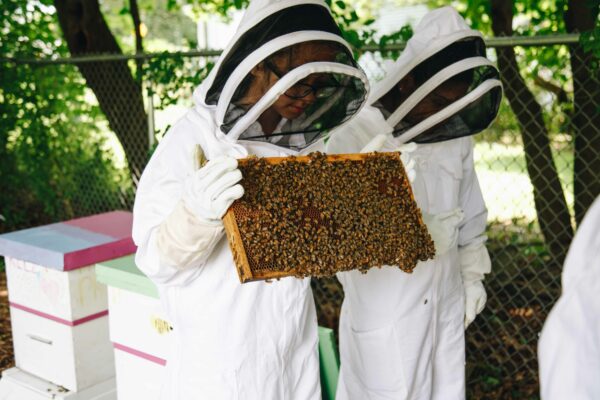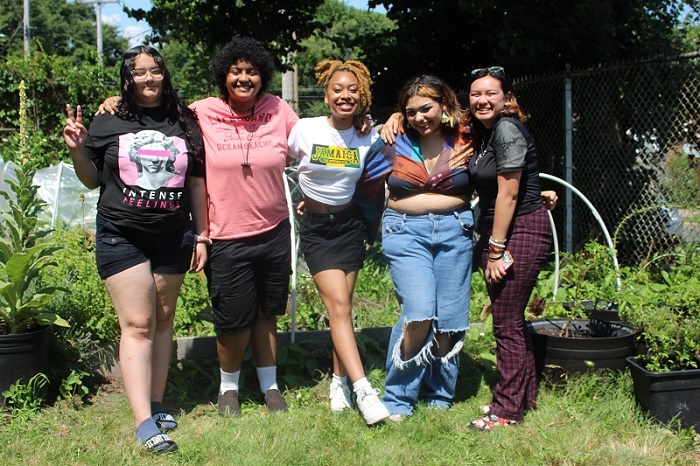Busy Bees: Huneebee Project Teaching Youth Mindfulness, Social Entrepreneurship
Through the art of beekeeping, adolescents and young adults from underserved communities are practicing mindfulness while developing vocational and entrepreneurial skills for a brighter future.

After experiencing burnout from her job as a social worker, Sarah Taylor began making beeswax candles as a way to cope. As she got to know local beekeepers, she was so inspired by their passion that she started beekeeping herself.
“I found it incredibly healing,” Taylor said. “Beekeeping requires you to be totally present and focused; all the worries and thoughts you have disappear in those moments.”
Thinking back to her time as a social worker, Taylor realized such mindfulness might be therapeutic for young people, especially those in foster care or protective services. Often, Taylor says, those systems are under-resourced and cannot adequately connect youth to opportunities. Combining her insights from beekeeping with her experience in social work, Taylor founded Huneebee Project in 2018. The New Haven-based social entrepreneurship organization works with adolescents and young adults, ages 15 to 23, from underserved communities.
The dual goal of the 15-week program – which runs on Saturdays -- is to provide transferable job skill-building opportunities within a therapeutic context. Participants are often referred by such community organizations as the Yale Child Study Center, Department of Children and Families (DCF), outpatient clinic providers, and school counselors. As part of the program, each participant is matched one-on-one with a mentor who provides individualized attention and support.
Last year, support from the Community Foundation for Greater New Haven helped Huneebee Project hire a lead beekeeper who co-leads bee-related training alongside Taylor. That’s allowed Huneebee Project to triple the number of cohorts – typically comprised of five or six young people – it has served over the past year. Between new staff and more participating kids, Taylor estimates that the honey production – which her organization sells online and through pop-up markets – has increased an estimated five hundred percent, with sale proceeds from the enterprise funneling back to support the program.
That revenue model also allows Huneebee participants to gain valuable hands-on job experience.

“Whether its marketing, customer interfacing, tracking inventory, or product creation,” Taylor said, “our program allows for job skills building.”
Additionally, the organization sells gardening seeds and planters, beeswax candles, branded coffee mugs, and apparel. Huneebee Project also runs a seasonal flower subscription service which provides eight weeks – June to September – of locally-harvested flowers from its gardens which are available for pick-up at the organization’s headquarters.
What inspires you?
Creating a charitable fund makes a difference now and forever.
But it’s more than just hands-on job skills experience participants are receiving, Taylor says. Huneebee Project also provides workshops – including resume writing – that help youth to market their program-related skills. In some cases, they don’t need to look far; to date, twelve past participants have been hired part-time by the organization – including six currently working with Huneebee – to support its nine garden sites and 40 hives.
What makes Taylor most happy is seeing the engagement of young people who may have struggled in the past to attend school.
“In order to graduate from our program, [participants] have to attend a minimum of 75% of our workshops and complete a finalized resume,” Taylor said. “On average, 96% of our participants achieve that.”
To continue to grow its capacity and funding to serve more youth, Huneebee offers a variety of sponsorship opportunities from a $55 level to install and maintain a bee hotel to a top-level $1,310 option that supports 10,000 bees and comes with corporate branding, social media posts and hive updates. Earlier this year, Huneebee secured a federal grant from the United States Department of Agriculture (USDA), which Taylor plans to use to build a commissary honey house and beekeeping training hub in Connecticut.
“We want to continue to support other local beekeepers – particularly those with backgrounds and identities underrepresented in the beekeeping community – and get to a place where [Huneebee] makes enough honey to sell year-round,” Taylor said.
For the youth served by Huneebee Project – and the Greater New Haven community – that’s a sweet opportunity.
